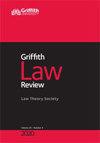Climate change, ‘slow violence’ and the indefinite deferral of responsibility for ‘loss and damage’
IF 0.9
Q1 LAW
引用次数: 10
Abstract
ABSTRACT This article traces debates within international climate regime on loss and damage from climate impacts. Impacts from climate change should be understood as incremental violence structurally over-determined by international relations of power and control that affect most acutely those who contributed least to dangerous levels of anthropocentric greenhouse gas emissions. Calls for compensation or reparation for ‘loss and damage’ are therefore a demand for climate justice. This article shows how questions of loss and damage were initially avoided within the climate regime. At the nineteenth Conference of the Parties in December 2013 the United Nations Framework Convention on Climate Change (UNFCCC) adopted the Warsaw International Mechanisms for Loss and Damage (WIM) associated with climate change. However, even then questions of compensative or reparative justice were persistently evaded. The institutionalisation of the WIM focused on questions of comprehensive risk assessment and disaster risk reduction and the promotion of privatised, insurance-based and financialised approaches to financing loss and damage. These operate in different ways to displace responsibility away from historical polluters, by nationalising responsibility to anticipate and prepare for disasters and seeking to responsibilise the vulnerable and risk-exposed subject.气候变化、“缓慢暴力”和无限期推迟对“损失和损害”的责任
本文追溯了国际气候机制中关于气候影响造成的损失和损害的争论。气候变化的影响应被理解为由国际权力和控制关系在结构上过度决定的渐进式暴力,对那些对以人类为中心的温室气体排放达到危险水平贡献最小的国家影响最大。因此,要求对“损失和损害”进行赔偿是对气候正义的一种要求。这篇文章展示了在气候制度下最初如何避免损失和损害的问题。2013年12月,《联合国气候变化框架公约》第十九次缔约方大会通过了《华沙气候变化损失与损害国际机制》。然而,即使在那时,赔偿或赔偿正义的问题也一直被回避。国际灾害管理机制的制度化侧重于全面风险评估和减少灾害风险的问题,以及促进为损失和损害提供资金的私有化、以保险为基础和金融化方法。它们以不同的方式运作,通过将预测和准备灾难的责任国有化,并寻求对脆弱和风险暴露主体负责,从而取代历史污染者的责任。
本文章由计算机程序翻译,如有差异,请以英文原文为准。
求助全文
约1分钟内获得全文
求助全文

 求助内容:
求助内容: 应助结果提醒方式:
应助结果提醒方式:


